AAQEP Accreditation
Standard 1 Aspect A
Standard 1a: Evidence shows that, by the time of program completion, candidates exhibit knowledge, skills, and abilities of professional educators appropriate to their target credential or degree, including: Content, pedagogical, and/or professional knowledge relevant to the credential or degree sought
Data Sources & Analysis:
Data Source 1
Comprehensive Examination
Perspective Captured from Data Source: Faculty
Rationale for using Data Source:
For a culminating experience, students in the MS in School Counseling may elect to
take a Comprehensive Exam during the final stages of their program. Students who do
not opt to take the comprehensive exam are required to complete a research project
or thesis.
The two-part exam consists of 100 multiple-choice questions and essay questions. Approximately 50% of the multiple-choice questions come from the core counseling courses and the balance come from the content areas of school counseling specialization. We are choosing the comprehensive exam’s multiple choice item scores as a data source for this standard because this exam directly assesses students’ pedagogical and professional knowledge relevant to the degree of Masters in Counseling with School Counseling as their specialization.
Specific Elements of Data Source:
For this standard, we have included students’ total scores to the multiple-choice
items that include both core and specialization related content.
Definition of Success for Each Element:
As per the departmental standards, students are required to score minimum of 70 points
to pass the comprehensive exam. For us, success means at least 90% of the students
receive a score of 80 points or above every year.
Displays of Analyzed Data:
Below are the tables of students’ scores on multiple choice questions and averages
per semester:
Comprehensive Exam Results
| Semester | Number who took Exam | Average Score |
|---|---|---|
| Fall 2019 | 21 | 80.95 |
| Fall 2020 | 16 | 87.63 |
| Spring 2021 | 7 | 82.57 |
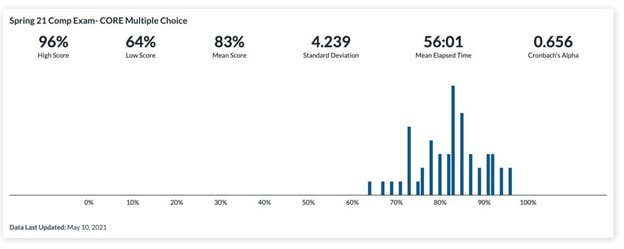
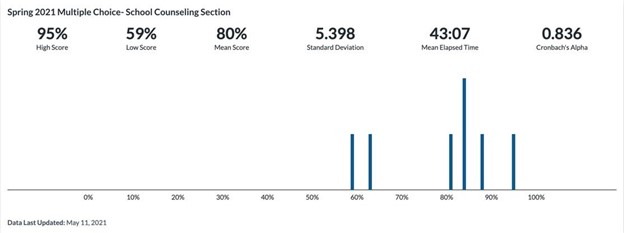 Link to Full Dataset:
Link to Full Dataset:
Full dataset per semester is stored on canvas and changes for every semester based
on which students take comprehensive exam. The tables above with comprehensive scores
represent full dataset for Fall 2019, Fall 2020 and Spring 2021.
Interpretation of Data:
As indicated by the tables above, students’ average scores are within the range of
80 to 83, which exceeds our departmental standard of 70 points. Apart from analyzing
students’ overall scores on multiple choice questions to gauge their success, program
faculty and especially the Comprehensive Exam coordinator engages in item analysis
to gauge the content areas that faculty needs to make greater efforts in teaching
given majority of students’ low scores in that content-area. For example, we realized
that students from all specializations were not scoring evenly and well on career
counseling content. We discussed this matter in our department meetings and found
out that, though the career counseling course is a core course requirement, when taught
by specialization-focused faculty, it becomes challenging to cover the content for
all specializations (e.g., marriage and family counseling, rehabilitation and clinical
mental health counseling, school counseling, student affairs and college counseling).
We thus revised the syllabus to place greater emphasis on the generalized nature of
career counseling across all settings and started providing students opportunities
for group presentations on career counseling applications in their specific settings
(e.g., school, university, rehabilitation center). We also revised comprehensive exam
items to focus on generalized career counseling theories, skills, and assessments.
In sum, given analysis of these items, every year faculty members create a pool of
multiple-choice questions and also ensure consistency across curricula to ensure that
students are provided opportunities to gain the assessed knowledge-content.
Data Source 2
COUN 241(Seminar in Organization of Counseling Services) Assignment:“Research Paper and School Counselor Interview”
To complete this assignment, students write and submit a research paper on a topic related to school counseling with following directions:
- Papers will include two parts: A school counselor interview and literature review. Students are required to critically analyze, synthesize, and evaluate research articles on the topic of their interest. Students should be able to suggest their own conclusions and implications for school counseling based on an interview with school counselor and literature review.
- This paper is intended to be helpful for students’ professional development and will be directly related to the course content.
- The paper will be a minimum of 5 pages of double-spaced typed text with APA style and formatting. Students must cite at least 3 articles published in referred journals.
- A rubric is provided for more detailed directions and expectations.
The assignment is graded based on students’ ability to synthesize the literature read on their topic of interest (e.g., self-esteem, career readiness, diversity issues) and ability to apply what was learned in the settings they served.
Perspective Captured from Data Source:
Faculty assessments of students’ present knowledge and pedagogical content.
Rationale for using Data Source:
The standard 1a focuses on the pedagogical, and/or professional knowledge relevant
to the credential/degree sought by students. This paper directly supports students
pursuing their Masters in School Counseling with PPS credential to actively read and
reflect upon the research-based, peer-reviewed articles that can help them to gain
pedagogical content. In addition, students are required to interview a professional
school counselor on the topic of their interest in relation to school counseling and
further reflect upon how they can apply the knowledge gained from this interview.
Specific Elements of Data Source:
For this data source, we focus on the overall score that students earn on the assignment,
which assesses students’ pedagogical and professional knowledge with regard to the
research topic they wrote on.
Definition of Success for Each Element:
Success for this data source will be indicated by achieving an average more than
85% during all academic years.
Displays of Analyzed Data:
Please see below the displays of class averages based on instructor’s grading on
canvas during the last four semesters:
Spring 2021 -91%
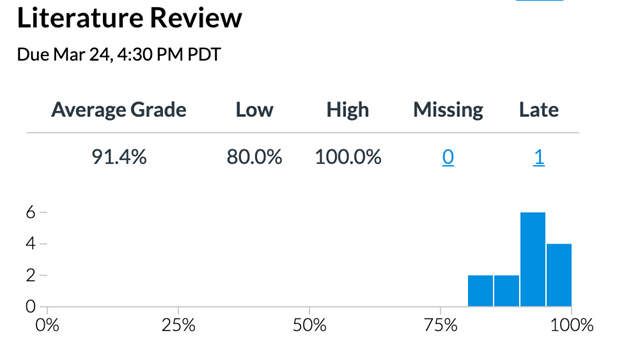
Fall 2020 - 89%
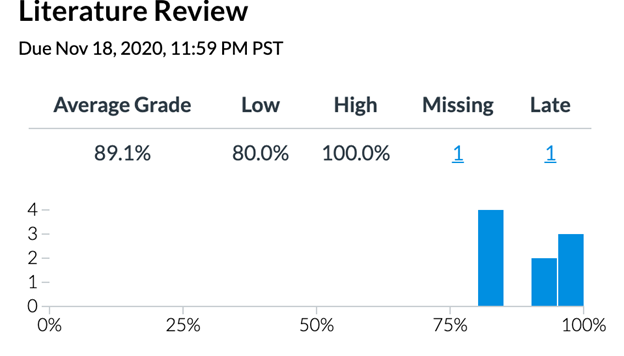
Spring 2020 - 87%
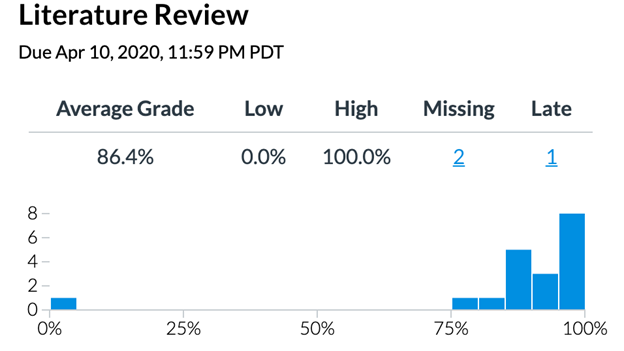
Fall 2019 - 92%
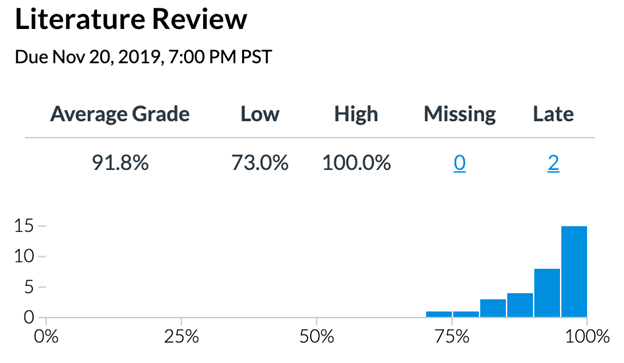
Link to Full Dataset:
Interpretation of Data:
The presented data source is a meaningful assignment for students to integrate what
they have learned from peer-reviewed journal articles, evidence-based practices, and
dialogues with professional school counselors into a comprehensive knowledge-base
on the topic of their professional interest. Some of the topics that students have
written about during the last three academic years are: 1. Child abuse and trauma;
2. School counseling and bullying; 3. School counselors fostering character education;
4. Crisis counseling; 5. Dropout prevention; 6. Group counseling in schools; 7. Counseling
students that self-injure; 8. ASCA National Model; 9. Role of school counselors in
challenging oppression; 10. Grief counseling in schools; 11. Counseling students with
disabilities; 10. Counseling students with eating disorders; 12. Suicide prevention;
13. Promoting students’ academic success, career development, and socio-emotional
wellbeing; 14. Parent involvement and partnerships; and 15. Multicultural counseling
and advocacy. As evident from this vast range of topics, this assignment has served
an important purpose in honing students’ pedagogical understanding in relation to
their aspirations as a professional school counselor. In future, we can further analyze
the nature of topics that students have chosen to research and the efforts faculty
can make to broaden their selected topics in the context of pedagogical content that
needs to be strengthened amidst current struggles such as growing mental health concerns
amidst global pandemic. Doing so will further enhance students’ ability to apply what
they are learning to resolve the concerns that their clients might be facing. The
data displayed has shown the current average of students’ ratings. The qualitative
review of students’ sample work demonstrates students’ commitment to expand their
professional knowledge relevant to the school counseling degree. However, greater
attempts need to be made in supporting students to reflect upon the applied nature
of the content that they have written about. This need was evident from reading the
research papers that students’ submitted for this class while working on AAQEP accreditation
paperwork. So, in future, within the assignment description, we plan to add that students
must use the knowledge gained from reading peer-reviewed journal articles and engaging
in dialogues with professional school counselors to suggest two evidence-based practices
that can promote a positive change within school settings – both at individual and
systemic levels. We will also make a comprehensive rubric that focus on applicability
of pedagogical content.
Data Source 3
Site Supervisor Program Evaluation Survey
Perspective Captured from Data Source: Site Supervisor
Rationale for using Data Source:
Assessing candidates’ pedagogical, and/or professional knowledge content is an important
aspect of their internship evaluation conducted by their site supervisor who has closely
watched and supervised their efforts as counselors-in-training. We have used the COUN
249 Site Supervisor Evaluation, through which site supervisors evaluate candidates’
fieldwork placement as a data source for this standard because some specific items
in this evaluation directly evaluate candidates’ current knowledge base related to
school counseling profession.
Specific Elements of Data Source:
The following items from the Site Supervisor Evaluation were selected for analysis:
- Understand and use appropriate measures pertaining to students with suicide and homicide risks.
- Have knowledge and ability to assess and provide prevention and intervention for other crisis and trauma situations that may occur on school campus, such as school shootings.
- Understand and apply ethical and the legal obligations to students, parents, administrators, and teachers.
- Maintaining professional and ethical boundaries in school counseling relationships per professional association ethical guidelines created by the American School Counselor Association.
- Understand and articulate the state laws and obligations regarding mandated reporting for child, elder, and dependent adults.
- Display professional disposition related to conduct, communication, demeanor, and presentation (appearance/written/oral) within the school counseling program, internship site, and profession.
We chose these items because they focus on students’ pedagogical knowledge and professional ability to effectively carry out school counselors responsibilities including interventions related to crisis, trauma, suicidal ideation in line with the school counseling profession’s ethical and legal guidelines.
Definition of Success for Each Element:
Site supervisors evaluated students on a 4-point likert scale (1 = Very Unsatisfactory,
2 = Moderately Unsatisfactory, 3 = Moderately Satisfactory, 4 = Very Satisfactory).
Success for this data source will be indicated by achieving an average of 3.0 or higher.
Displays of Analyzed Data:
A total of 28 site supervisor evaluations were analyzed. All evaluations were from
one academic year because previous academic years evaluations were in form of hardcopies
which could not be accessed due to COVID-19 pandemic safety protocols and working
remotely. Only Spring 2020 (when COVID-19 pandemic started) and Fall 2020 surveys
were conducted online and hence only those could be analyzed.
Please see below a table that displays the means across survey items from the site supervisor evaluation that addresses this standard.
| Survey Item | Sample Size | Mean |
|---|---|---|
| Understand and use appropriate measures pertaining to students with suicide and homicide risks. | 26 |
3.58 |
| Have knowledge and ability to assess and provide prevention and intervention for other crisis and trauma situations that may occur on school campus, such as school shootings. | 26 |
3.54 |
| Understand and apply ethical and the legal obligations to students, parents, administrators, and teachers. | 28 |
3.75 |
| Maintaining professional and ethical boundaries in school counseling relationships per professional association ethical guidelines created by the American School Counselor Association. | 28 |
3.82 |
| Understand and articulate the state laws and obligations regarding mandated reporting for child, elder, and dependent adults. | 27 |
3.78 |
| Display professional disposition related to conduct, communication, demeanor, and presentation (appearance/written/oral) within the school counseling program, internship site, and profession. | 28 |
3.86 |
Link to Full Dataset:
Interpretation of Data:
Means for six survey items from the site supervisor evaluation were calculated and
examined. The range of the means for these survey items was 3.54 to 3.86. All means
were above 3.0, indicating that site supervisors rated all students in the “moderately
satisfactory” to “very satisfactory” range. This suggests that site supervisors generally
perceived students to exhibit the knowledge, skills, and abilities related to content,
pedagogical, and/or professional knowledge relevant to the credential or degree sought.
Next Steps:
Based on the data analysis of the three data sources presented, we can conclude that
students’ average scores and evaluations exceed department standards in the area of
pedagogical and professional knowledge. Students have demonstrated a wide range of
content that they have learned and further applied to serve a diverse group of K-12
students.
In the future, we will continue to engage in item analysis of the comprehensive exam, which plays a critical role in evaluating whether or not students are gaining, retaining, and applying the knowledge in all core areas of the counseling profession such as counseling theories, assessment, ethics, career counseling, group counseling and so on. Along with item analysis, we will also continue to discuss within department meetings if syllabus used across specializations and course sections are consistent in terms of key pedagogical content that needs to be covered to best prepare students as counselors-in-training.
Students will also be advised to continue reading and reflecting upon more peer-reviewed articles to stay abreast with latest knowledge content since the counseling field is constantly evolving. Greater attempts will also be made to support students to reflect upon the applied nature of the content that they have written about. For example, within the assignments description and rubrics, we will add that students must use the knowledge gained from reading peer-reviewed journal articles and engaging in dialogues with professional school counselors to suggest two evidence-based practices that can promote a positive change within school settings – both at individual and systemic levels.
With regard to field experience, students are already rated highly by their site supervisors in their demonstration of required knowledge, skills, and abilities related to school counseling profession and pedagogy. We will continue to strengthen our internship courses to help students keep advancing in this area especially by incorporating latest research and school counseling theories.